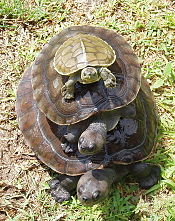Ryukyu black-breasted leaf turtle
| Ryukyu black-breasted leaf turtle | |
|---|---|

| |
| Scientific classification | |
| Domain: | Eukaryota |
| Kingdom: | Animalia |
| Phylum: | Chordata |
| Class: | Reptilia |
| Order: | Testudines |
| Suborder: | Cryptodira |
| Superfamily: | Testudinoidea |
| Family: | Geoemydidae |
| Genus: | Geoemyda |
| Species: | G. japonica |
| Binomial name | |
| Geoemyda japonica Fan, 1931 | |
| Synonyms[2] | |
| |
The Ryukyu black-breasted leaf turtle or Ryukyu leaf turtle (Geoemyda japonica) is a species of turtles in the family Geoemydidae (formerly Bataguridae) endemic to the Ryukyu Islands in Japan. In 1975, the species was designated a National Natural Monument of Japan.[3] It grows to about 5–6 inches long. In captivity, it feeds on worms, snails, insects, and fruit. Due to its rarity and very attractive appearance, this species is highly coveted by turtle collectors worldwide.[4]
At first it was considered a subspecies of Geoemyda spengleri, and named Geoemyda spengleri japonica. It was redescribed as a separate species and given its current binomial name in 1992.[3]
Hybrids between different genera of Geoemydidae are rather commonplace. This species is known to hybridize with Cuora flavomarginata males in captivity and in the wild.[5]
References
- ^ "Appendices | CITES". cites.org. Retrieved 2022-01-14.
- ^ Fritz Uwe; Peter Havaš (2007). "Checklist of Chelonians of the World". Vertebrate Zoology. 57 (2): 222. doi:10.3897/vz.57.e30895. ISSN 1864-5755.
- ^ a b Yasukawa, Yuichirou; Ota, Hidetoshi (2008-05-15). "Geoemyda Japonica Fan 1931 – Ryukyu Black-Breasted Leaf Turtle, Okinawa Black-Breasted Leaf Turtle". Chelonian Research Monographs. 5 (5). Chelonian Research Foundation: 002.1–6. doi:10.3854/crm.5.002.japonica.v1.2008. ISSN 1088-7105.
- ^ "Smuggled Ryukyu Black-breasted Leaf Turtles Head Home to Japan". Kadoorie Farm and Botanic Garden::嘉道理農場暨植物園. Retrieved 2023-09-25.
- ^ Buskirk et al. (2005).
Further reading
- Asian Turtle Trade Working Group (2000). "Geoemyda japonica". The IUCN Red List of Threatened Species. 2000. IUCN: e.T9042A97362115. doi:10.2305/IUCN.UK.2000.RLTS.T9042A12952738.en. Listed as Endangered (EN A1ce, B1+2c)
- Buskirk, James R.; Parham, James F. & Feldman, Chris R. (2005): On the hybridisation between two distantly related Asian turtles (Testudines: Sacalia × Mauremys). Salamandra 41: 21–26. PDF fulltext[permanent dead link]


